Project Management Methodologies: Comparison and PLC Analysis
VerifiedAdded on 2023/06/10
|6
|1206
|98
Report
AI Summary
This report provides a comprehensive overview of project management methodologies. It begins by defining a methodology and explaining its critical role in structuring, planning, and controlling project activities. The report then delves into a comparative analysis of two prominent methodologies: Waterfall and Agile, highlighting their similarities and key differences in approach, execution, and adaptability. The analysis includes their strengths, weaknesses, and suitability for different project types. Furthermore, the report establishes the relationship between the chosen methodologies and the project life cycle (PLC), illustrating how Waterfall and Agile align with the phases of initiation, planning, execution, and closure. The report references relevant literature to support its analysis and conclusions, providing a well-rounded understanding of project management methodologies and their practical application.
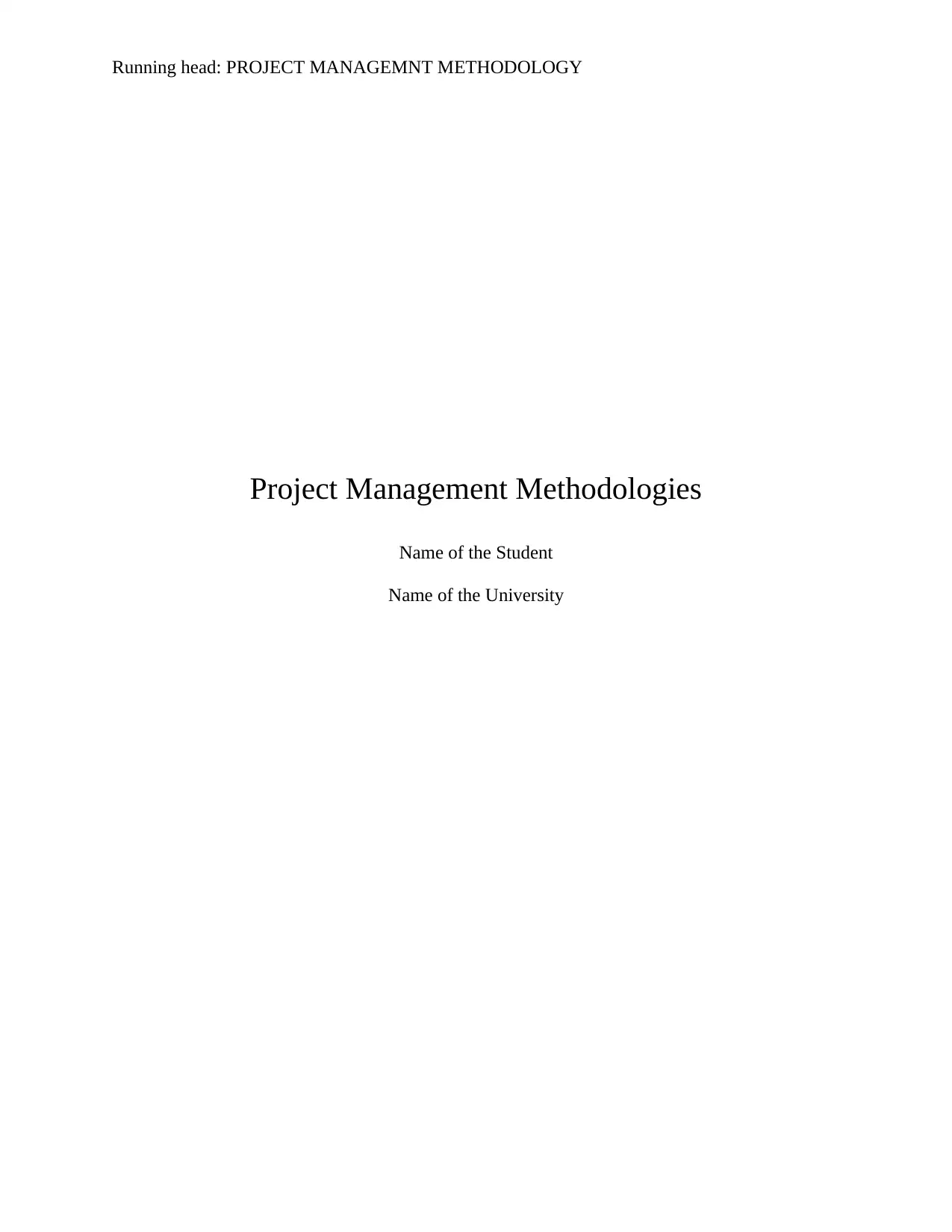
Running head: PROJECT MANAGEMNT METHODOLOGY
Project Management Methodologies
Name of the Student
Name of the University
Project Management Methodologies
Name of the Student
Name of the University
Paraphrase This Document
Need a fresh take? Get an instant paraphrase of this document with our AI Paraphraser
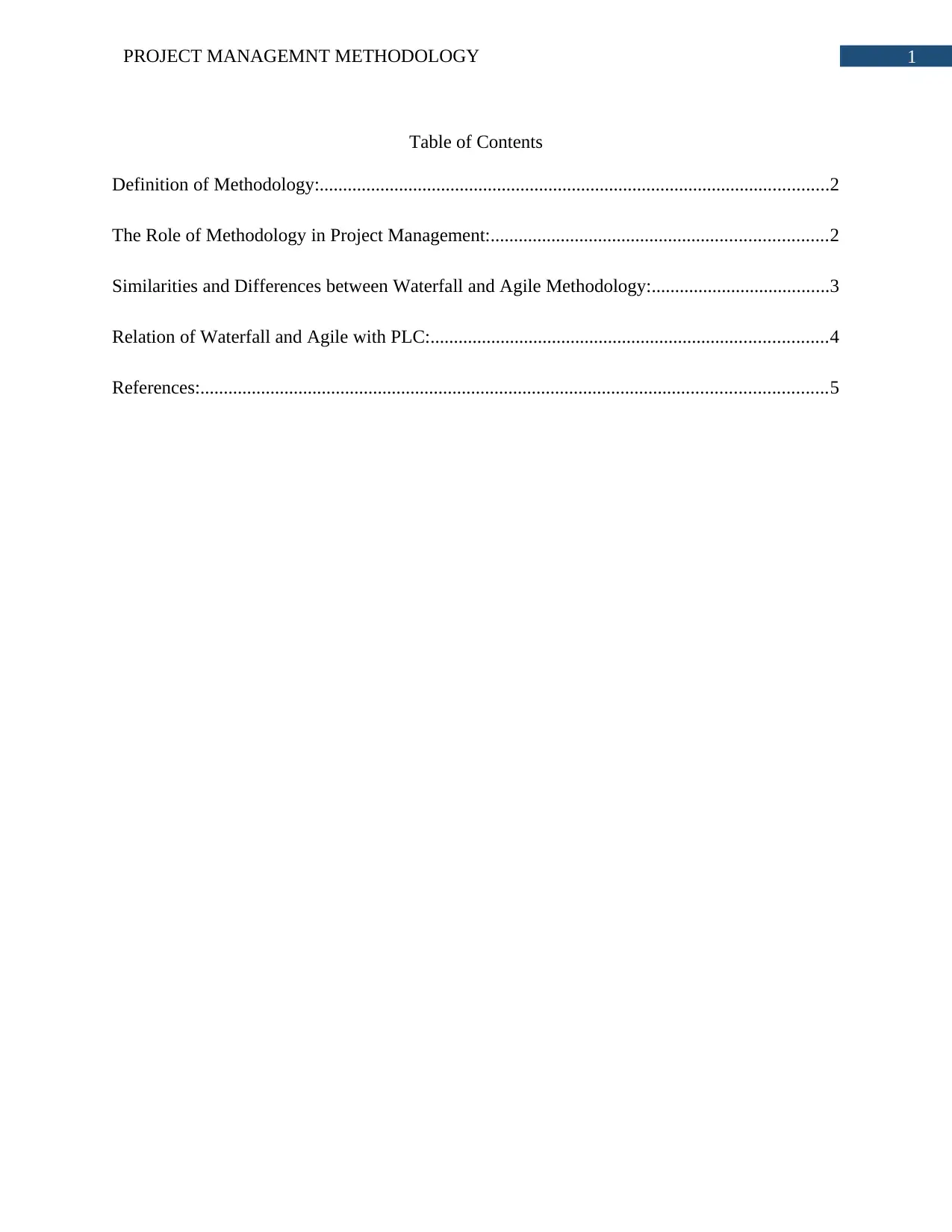
1PROJECT MANAGEMNT METHODOLOGY
Table of Contents
Definition of Methodology:.............................................................................................................2
The Role of Methodology in Project Management:........................................................................2
Similarities and Differences between Waterfall and Agile Methodology:......................................3
Relation of Waterfall and Agile with PLC:.....................................................................................4
References:......................................................................................................................................5
Table of Contents
Definition of Methodology:.............................................................................................................2
The Role of Methodology in Project Management:........................................................................2
Similarities and Differences between Waterfall and Agile Methodology:......................................3
Relation of Waterfall and Agile with PLC:.....................................................................................4
References:......................................................................................................................................5
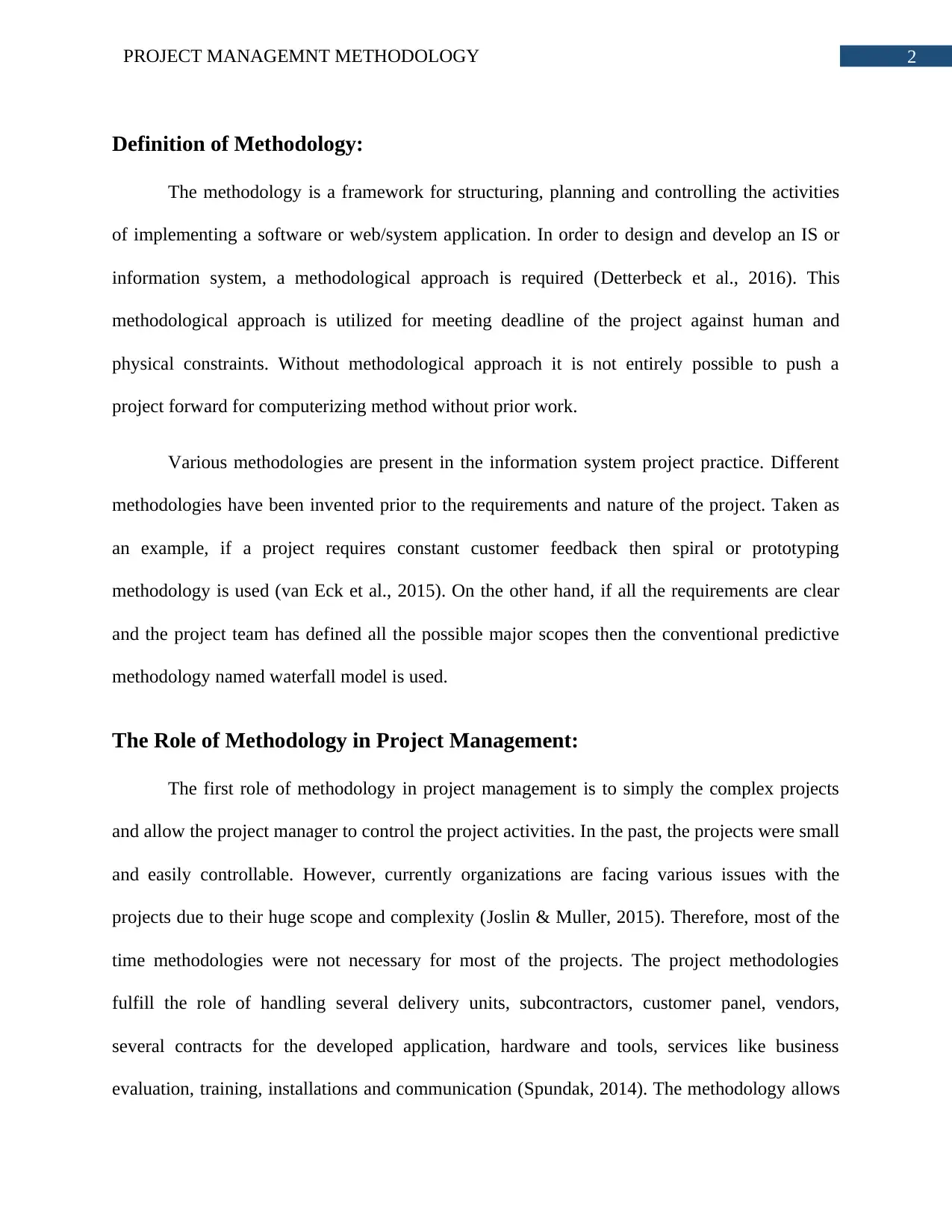
2PROJECT MANAGEMNT METHODOLOGY
Definition of Methodology:
The methodology is a framework for structuring, planning and controlling the activities
of implementing a software or web/system application. In order to design and develop an IS or
information system, a methodological approach is required (Detterbeck et al., 2016). This
methodological approach is utilized for meeting deadline of the project against human and
physical constraints. Without methodological approach it is not entirely possible to push a
project forward for computerizing method without prior work.
Various methodologies are present in the information system project practice. Different
methodologies have been invented prior to the requirements and nature of the project. Taken as
an example, if a project requires constant customer feedback then spiral or prototyping
methodology is used (van Eck et al., 2015). On the other hand, if all the requirements are clear
and the project team has defined all the possible major scopes then the conventional predictive
methodology named waterfall model is used.
The Role of Methodology in Project Management:
The first role of methodology in project management is to simply the complex projects
and allow the project manager to control the project activities. In the past, the projects were small
and easily controllable. However, currently organizations are facing various issues with the
projects due to their huge scope and complexity (Joslin & Muller, 2015). Therefore, most of the
time methodologies were not necessary for most of the projects. The project methodologies
fulfill the role of handling several delivery units, subcontractors, customer panel, vendors,
several contracts for the developed application, hardware and tools, services like business
evaluation, training, installations and communication (Spundak, 2014). The methodology allows
Definition of Methodology:
The methodology is a framework for structuring, planning and controlling the activities
of implementing a software or web/system application. In order to design and develop an IS or
information system, a methodological approach is required (Detterbeck et al., 2016). This
methodological approach is utilized for meeting deadline of the project against human and
physical constraints. Without methodological approach it is not entirely possible to push a
project forward for computerizing method without prior work.
Various methodologies are present in the information system project practice. Different
methodologies have been invented prior to the requirements and nature of the project. Taken as
an example, if a project requires constant customer feedback then spiral or prototyping
methodology is used (van Eck et al., 2015). On the other hand, if all the requirements are clear
and the project team has defined all the possible major scopes then the conventional predictive
methodology named waterfall model is used.
The Role of Methodology in Project Management:
The first role of methodology in project management is to simply the complex projects
and allow the project manager to control the project activities. In the past, the projects were small
and easily controllable. However, currently organizations are facing various issues with the
projects due to their huge scope and complexity (Joslin & Muller, 2015). Therefore, most of the
time methodologies were not necessary for most of the projects. The project methodologies
fulfill the role of handling several delivery units, subcontractors, customer panel, vendors,
several contracts for the developed application, hardware and tools, services like business
evaluation, training, installations and communication (Spundak, 2014). The methodology allows
⊘ This is a preview!⊘
Do you want full access?
Subscribe today to unlock all pages.

Trusted by 1+ million students worldwide
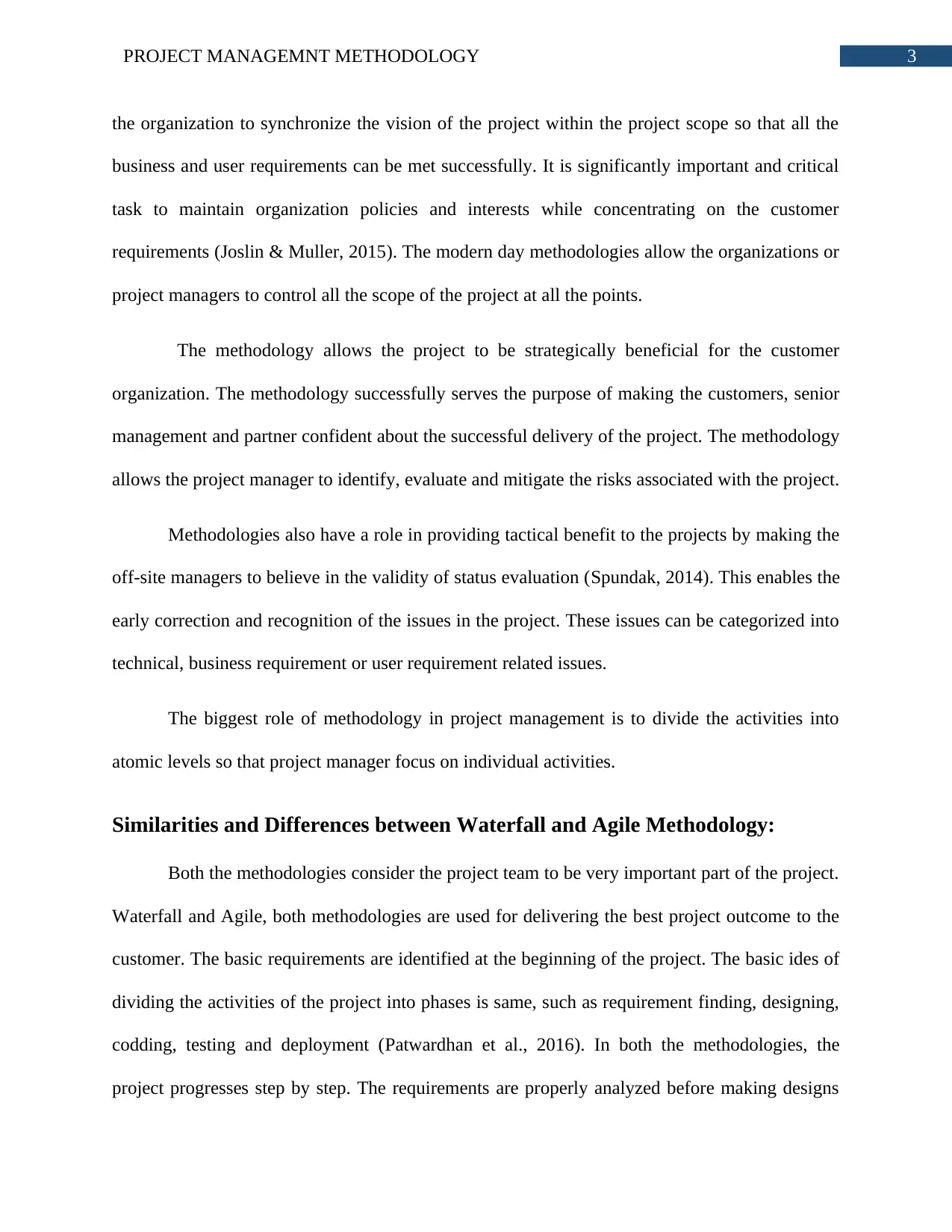
3PROJECT MANAGEMNT METHODOLOGY
the organization to synchronize the vision of the project within the project scope so that all the
business and user requirements can be met successfully. It is significantly important and critical
task to maintain organization policies and interests while concentrating on the customer
requirements (Joslin & Muller, 2015). The modern day methodologies allow the organizations or
project managers to control all the scope of the project at all the points.
The methodology allows the project to be strategically beneficial for the customer
organization. The methodology successfully serves the purpose of making the customers, senior
management and partner confident about the successful delivery of the project. The methodology
allows the project manager to identify, evaluate and mitigate the risks associated with the project.
Methodologies also have a role in providing tactical benefit to the projects by making the
off-site managers to believe in the validity of status evaluation (Spundak, 2014). This enables the
early correction and recognition of the issues in the project. These issues can be categorized into
technical, business requirement or user requirement related issues.
The biggest role of methodology in project management is to divide the activities into
atomic levels so that project manager focus on individual activities.
Similarities and Differences between Waterfall and Agile Methodology:
Both the methodologies consider the project team to be very important part of the project.
Waterfall and Agile, both methodologies are used for delivering the best project outcome to the
customer. The basic requirements are identified at the beginning of the project. The basic ides of
dividing the activities of the project into phases is same, such as requirement finding, designing,
codding, testing and deployment (Patwardhan et al., 2016). In both the methodologies, the
project progresses step by step. The requirements are properly analyzed before making designs
the organization to synchronize the vision of the project within the project scope so that all the
business and user requirements can be met successfully. It is significantly important and critical
task to maintain organization policies and interests while concentrating on the customer
requirements (Joslin & Muller, 2015). The modern day methodologies allow the organizations or
project managers to control all the scope of the project at all the points.
The methodology allows the project to be strategically beneficial for the customer
organization. The methodology successfully serves the purpose of making the customers, senior
management and partner confident about the successful delivery of the project. The methodology
allows the project manager to identify, evaluate and mitigate the risks associated with the project.
Methodologies also have a role in providing tactical benefit to the projects by making the
off-site managers to believe in the validity of status evaluation (Spundak, 2014). This enables the
early correction and recognition of the issues in the project. These issues can be categorized into
technical, business requirement or user requirement related issues.
The biggest role of methodology in project management is to divide the activities into
atomic levels so that project manager focus on individual activities.
Similarities and Differences between Waterfall and Agile Methodology:
Both the methodologies consider the project team to be very important part of the project.
Waterfall and Agile, both methodologies are used for delivering the best project outcome to the
customer. The basic requirements are identified at the beginning of the project. The basic ides of
dividing the activities of the project into phases is same, such as requirement finding, designing,
codding, testing and deployment (Patwardhan et al., 2016). In both the methodologies, the
project progresses step by step. The requirements are properly analyzed before making designs
Paraphrase This Document
Need a fresh take? Get an instant paraphrase of this document with our AI Paraphraser
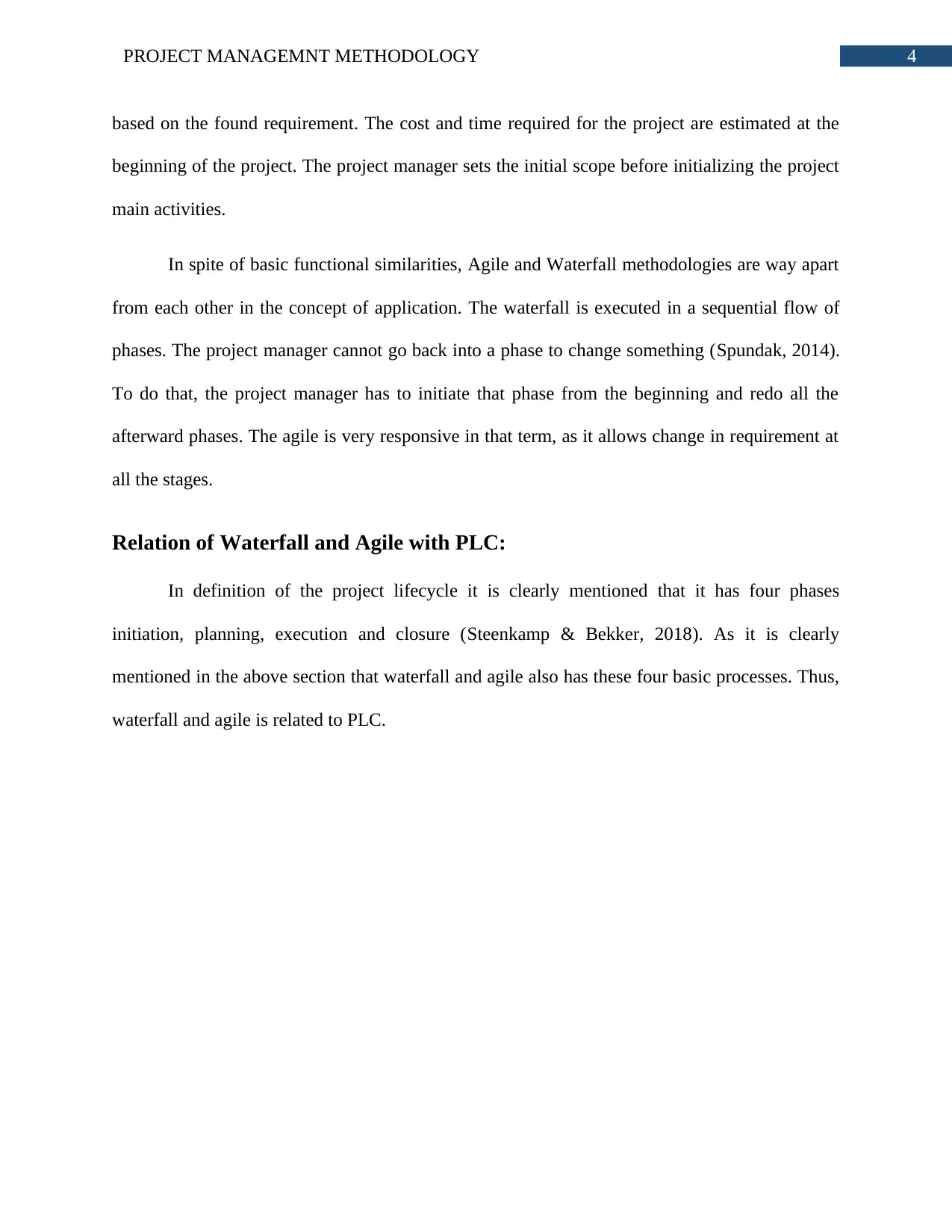
4PROJECT MANAGEMNT METHODOLOGY
based on the found requirement. The cost and time required for the project are estimated at the
beginning of the project. The project manager sets the initial scope before initializing the project
main activities.
In spite of basic functional similarities, Agile and Waterfall methodologies are way apart
from each other in the concept of application. The waterfall is executed in a sequential flow of
phases. The project manager cannot go back into a phase to change something (Spundak, 2014).
To do that, the project manager has to initiate that phase from the beginning and redo all the
afterward phases. The agile is very responsive in that term, as it allows change in requirement at
all the stages.
Relation of Waterfall and Agile with PLC:
In definition of the project lifecycle it is clearly mentioned that it has four phases
initiation, planning, execution and closure (Steenkamp & Bekker, 2018). As it is clearly
mentioned in the above section that waterfall and agile also has these four basic processes. Thus,
waterfall and agile is related to PLC.
based on the found requirement. The cost and time required for the project are estimated at the
beginning of the project. The project manager sets the initial scope before initializing the project
main activities.
In spite of basic functional similarities, Agile and Waterfall methodologies are way apart
from each other in the concept of application. The waterfall is executed in a sequential flow of
phases. The project manager cannot go back into a phase to change something (Spundak, 2014).
To do that, the project manager has to initiate that phase from the beginning and redo all the
afterward phases. The agile is very responsive in that term, as it allows change in requirement at
all the stages.
Relation of Waterfall and Agile with PLC:
In definition of the project lifecycle it is clearly mentioned that it has four phases
initiation, planning, execution and closure (Steenkamp & Bekker, 2018). As it is clearly
mentioned in the above section that waterfall and agile also has these four basic processes. Thus,
waterfall and agile is related to PLC.
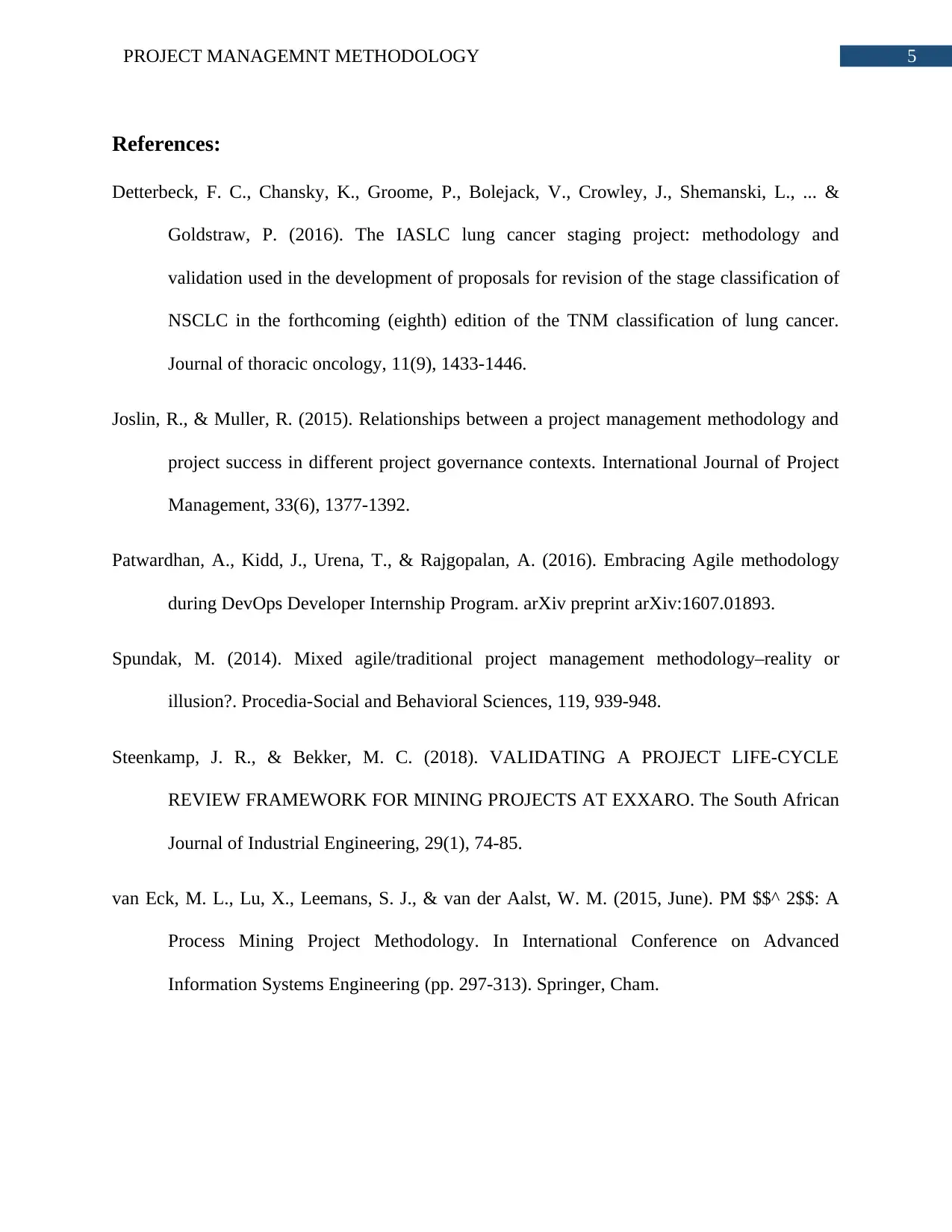
5PROJECT MANAGEMNT METHODOLOGY
References:
Detterbeck, F. C., Chansky, K., Groome, P., Bolejack, V., Crowley, J., Shemanski, L., ... &
Goldstraw, P. (2016). The IASLC lung cancer staging project: methodology and
validation used in the development of proposals for revision of the stage classification of
NSCLC in the forthcoming (eighth) edition of the TNM classification of lung cancer.
Journal of thoracic oncology, 11(9), 1433-1446.
Joslin, R., & Muller, R. (2015). Relationships between a project management methodology and
project success in different project governance contexts. International Journal of Project
Management, 33(6), 1377-1392.
Patwardhan, A., Kidd, J., Urena, T., & Rajgopalan, A. (2016). Embracing Agile methodology
during DevOps Developer Internship Program. arXiv preprint arXiv:1607.01893.
Spundak, M. (2014). Mixed agile/traditional project management methodology–reality or
illusion?. Procedia-Social and Behavioral Sciences, 119, 939-948.
Steenkamp, J. R., & Bekker, M. C. (2018). VALIDATING A PROJECT LIFE-CYCLE
REVIEW FRAMEWORK FOR MINING PROJECTS AT EXXARO. The South African
Journal of Industrial Engineering, 29(1), 74-85.
van Eck, M. L., Lu, X., Leemans, S. J., & van der Aalst, W. M. (2015, June). PM $$^ 2$$: A
Process Mining Project Methodology. In International Conference on Advanced
Information Systems Engineering (pp. 297-313). Springer, Cham.
References:
Detterbeck, F. C., Chansky, K., Groome, P., Bolejack, V., Crowley, J., Shemanski, L., ... &
Goldstraw, P. (2016). The IASLC lung cancer staging project: methodology and
validation used in the development of proposals for revision of the stage classification of
NSCLC in the forthcoming (eighth) edition of the TNM classification of lung cancer.
Journal of thoracic oncology, 11(9), 1433-1446.
Joslin, R., & Muller, R. (2015). Relationships between a project management methodology and
project success in different project governance contexts. International Journal of Project
Management, 33(6), 1377-1392.
Patwardhan, A., Kidd, J., Urena, T., & Rajgopalan, A. (2016). Embracing Agile methodology
during DevOps Developer Internship Program. arXiv preprint arXiv:1607.01893.
Spundak, M. (2014). Mixed agile/traditional project management methodology–reality or
illusion?. Procedia-Social and Behavioral Sciences, 119, 939-948.
Steenkamp, J. R., & Bekker, M. C. (2018). VALIDATING A PROJECT LIFE-CYCLE
REVIEW FRAMEWORK FOR MINING PROJECTS AT EXXARO. The South African
Journal of Industrial Engineering, 29(1), 74-85.
van Eck, M. L., Lu, X., Leemans, S. J., & van der Aalst, W. M. (2015, June). PM $$^ 2$$: A
Process Mining Project Methodology. In International Conference on Advanced
Information Systems Engineering (pp. 297-313). Springer, Cham.
⊘ This is a preview!⊘
Do you want full access?
Subscribe today to unlock all pages.

Trusted by 1+ million students worldwide
1 out of 6
Related Documents
Your All-in-One AI-Powered Toolkit for Academic Success.
+13062052269
info@desklib.com
Available 24*7 on WhatsApp / Email
![[object Object]](/_next/static/media/star-bottom.7253800d.svg)
Unlock your academic potential
Copyright © 2020–2025 A2Z Services. All Rights Reserved. Developed and managed by ZUCOL.


